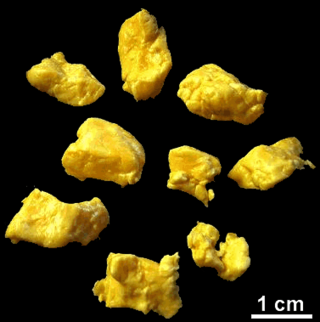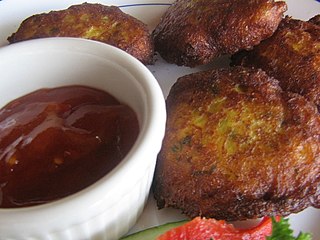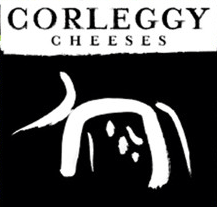| Burren Gold | |
|---|---|
| Country of origin | Ireland |
| Region | County Clare |
| Town | Ballyvaughan |
| Source of milk | Cow |
| Pasteurised | Yes |
| Weight | 500g, 4kg, |
Burren Gold is a Gouda style Irish cheese made from pasteurised cows milk. The cheese is made at the Aillwee Cave in Ballyvaughan in County Clare and the rounds are waxed by hand. [1] The cheese is available in a number of flavours: Plain, Cumin, Nettles and Garlic, Black Pepper, Piri Piri and Smoked.
In 2009 at the Listowel food fair, Burren Gold won all three awards in the "Best Flavour Added Cheese" category. The Gold was awarded to Black pepper, Silver to Oak smoked, and Bronze to Cumin seed. [2]

Head cheese or brawn is a meat jelly or terrine made of meat. Somewhat similar to a jellied meatloaf, it is made with flesh from the head of a calf or pig, typically set in aspic. It is usually eaten cold, at room temperature, or in a sandwich. Despite its name, the dish is not a cheese and contains no dairy products. The parts of the head used vary, and may include the tongue but do not commonly include the brain, eyes or ears. Trimmings from more commonly eaten cuts of pork and veal are often used, and sometimes the feet and heart, with gelatin added as a binder.

Hungarian or Magyar cuisine is the cuisine characteristic of the nation of Hungary, and its primary ethnic group, the Magyars. Hungarian cuisine has been described as being the spiciest cuisine in Europe. This can largely be attributed to the use of their piquant native spice, Hungarian paprika, in many of their dishes. A mild version of the spice, Hungarian sweet paprika, is commonly used as an alternative. Traditional Hungarian dishes are primarily based on meats, seasonal vegetables, fruits, bread, and dairy products.

Chorizo is a type of pork sausage originating from the Iberian Peninsula. It is made in many national and regional varieties in several countries on different continents. Some of these varieties are quite different from each other, occasionally leading to confusion or disagreements over the names and identities of the products in question.

Cheese curds are moist pieces of curdled milk, eaten either alone as a snack, or used in prepared dishes. They are most often consumed throughout the northern United States and Canada. Notably, cheese curds are popular in Quebec, as part of the dish poutine, and in Wisconsin and Minnesota where they can be served breaded and deep fried. Curds are sometimes referred to as "squeaky cheese" or fromage en grain.

Leyden, from Dutch: Leidse kaas, is a semi-hard, cumin and caraway seed flavoured cheese made in the Netherlands from cow's milk. It is made both in factories and on farms, historically in the Leiden area.

The oldest known book on Portuguese cuisine, entitled Livro de Cozinha da Infanta D. Maria de Portugal, from the 16th century, describes many popular dishes of meat, fish, poultry and others.

Raita is a side dish in Indian cuisine made of dahi together with raw or cooked vegetables, fruit, or in the case of boondi raita, with fried droplets of batter made from besan.

Gubbeen Cheese is a surface ripened, semi-soft, cow's milk cheese with a pink and white rind. The flavours are creamy with mushroom and nutty aftertastes but vary depending on maturity of cheese. Gubbeen Farmhouse Products also produce a Smoked Gubbeen.

Pasanda, also called Parche, is a popular dish from the Indian subcontinent, notably North India, Rampur, Hyderabadi and Pakistani, derived from a meal served in the court of the Mughal emperors. The word is a variation on the Hindi-Urdu word "pasande" meaning "favourite", which refers to the prime cuts of meat traditionally used in the dish. The word "Pasande" is borrowed from the Persian verb پسندیدن (Pasandidan). The dish may also be prepared with Paneer cheese.

Cypriot cuisine is the cuisine of the island of Cyprus.

Duqqa, du'ah, do'a, or dukkah is an Egyptian and Middle Eastern condiment consisting of a mixture of herbs, nuts, and spices. It is typically used as a dip with bread or fresh vegetables for an hors d'œuvre. Pre-made versions of duqqa can be bought in the spice markets of Cairo, where they are sold in paper cones, with the simplest version being crushed mint, salt, and pepper. The packaged variety that is found in markets is composed of parched wheat flour mixed with cumin and caraway. In the Hejaz region, it has been part of the regional cuisine for decades.

Chili sauce and chili paste are condiments prepared with chili peppers.

Scottish cuisine encompasses the cooking styles, traditions and recipes associated with Scotland. It has distinctive attributes and recipes of its own, but also shares much with other British and wider European cuisine as a result of local, regional, and continental influences — both ancient and modern.

Corleggy Cheeses is an Irish cheese producer in County Cavan. It was started by Silke Cropp in 1985 using milk from her own goat herd. Today Corleggy make a variety of different cheese from goat's milk, sheep's milk and cow's milk sourced from local farmers.

Hungarian sausages are sausages found in the cuisine of Hungary. Hungary produces a vast number of sui sausage types. They may be boiled, fresh or dried, and smoked, with different spices and flavors, "hot" or "mild". Many were influenced by their neighbors and brethren.

Tunisian cuisine, the cuisine of Tunisia, consists of the cooking traditions, ingredients, recipes and techniques developed in Tunisia since antiquity. It is mainly a blend of Mediterranean and native Berber cuisine with Punic influences. Historically, Tunisian cuisine witnessed influence and exchanges with many cultures and nations like Italians, Andalusians, French and Arabs.
The Burren Smokehouse is an Irish family-run producer of smoked fish.
BellaVitano is a cow's milk cheese made by the Sartori Company of Plymouth, Wisconsin. Introduced in 2008, BellaVitano Gold is a hard cheese that is described as having a nutty, fruity flavour and is also available in a number of flavoured varieties.